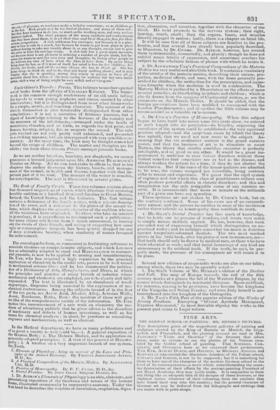The Guide to Service : The Lady's Maid. This little
tract is written in a shrewd, searching, observing spirit; and points out clearly the duties of a lady's maid, or at least what the writer con- ceives a lady's maid has to do. It also weighs fairly enough the pros and cons of such a place, and distributes a good deal of proper and moral advice. Some of it, however, is of a very conventional sort—" proper for servants ;" and reminds us strongly of tracts of another kind, that were extensively circulated during the heyday of HUNT, Comma', and Green Bags. See, for example, dm solemn lamentation over the toils of the rich.
" As long as the rich pay for what they desiee to have, they have every riei' to please themselves. But it is far from being true that they live in luxury fe • Spectator, No.500 ; 27th January 1938.
the ke of pleasure, as woamen make a bolyday sometime., or as children go Rich people may be too fond of pleasate, and many of them ore: to thefair- el to do ton as much as the working man, and eery serious
RIND • •
but they have I &ions indeed. The chief purpose of the many comforts and conveniences that they have about them, is to set their time and their thoughts free for their occupations. A rich nobleman has carriages, not because it is a plea. li ‘e'rle to him to ride in a coach, but because be wants CO get from place to place w!ithout having to take any trouble about it, or any thought, except just to give the order to have his carriage ready. A rich lady has a great many servants, not because there is any pleasure in ordering a number of people about, but be- cause she wants to save her own time and thoughts, by hiring other people to de, without any care of hers, what she likes to have done. 11y every thing being done for her, as if it went of itself. her mind is free fur her children, her friends, her books, and all the serious things she has to think of She has many thing. to think of, and to do, that you know nothing about ; and it may happen that she is spending money very wisely in paying to have all go 1,000thly about her, when, if she woe eating for nothing but her own indul- gence, such a way of living might be very selfish and e:•:!ravagant."



























 Previous page
Previous page